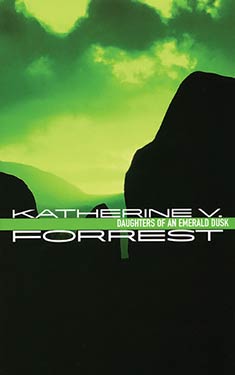Katherine V.
Forrest
Completed 6/23/2019,
Reviewed 6/23/2019
4 stars
This book is
a wonderful conclusion to the trilogy which began strongly in Daughters of a Coral Dawn and continued weakly in Daughters of an Amber Noon. Like the first, it is written from several
voices’ perspectives, weaving a complete narrative that is active rather than
expositional, which was my biggest problem with the second book. The theme is that the best intentions can
have unintended consequences, as the women’s utopia created on the planet Maternas
gets thrown for a loop by the very odd behavior of its younger
generations. It brings in Gaia theory,
that is, the theory that a planet is a self-regulating, complex system where
living organisms interact with their inorganic surroundings to maintain and
perpetuate the conditions for life on the planet. The introduction of the Unity, the now ten
thousand women who settled on Maternas from Earth, has tipped the balance of Maternas
and the planet is now fighting back.
This book won the Lambda Literary Award for Science Fiction/Fantasy/Horror
in 2006, and I think it was very deserving.
 The book
begins with the arrival of more women from Earth on Maternas, including Olympia
and Joss, two of the narrators from the second book. They find it beautiful but notice strange
behavior of the young people. With the
return of Megan the original emigrants’ leader, Minerva the historian, and
Mother back to the planet, the council calls a meeting to discuss the problem
with the new generations of daughters. Due
to a time warp for the people who traveled to and from Earth, fifty-five years
have passed, and there are two generations of daughters who do not communicate
and have left the utopia built by the founders to live on the continent of Amazonia
on the equator. The parents are
distraught and have stopped having children until something can be figured
out. What follows is a journey to the
heart and mind of a planet that is out of balance and doing anything it can to
repair itself.
The book
begins with the arrival of more women from Earth on Maternas, including Olympia
and Joss, two of the narrators from the second book. They find it beautiful but notice strange
behavior of the young people. With the
return of Megan the original emigrants’ leader, Minerva the historian, and
Mother back to the planet, the council calls a meeting to discuss the problem
with the new generations of daughters. Due
to a time warp for the people who traveled to and from Earth, fifty-five years
have passed, and there are two generations of daughters who do not communicate
and have left the utopia built by the founders to live on the continent of Amazonia
on the equator. The parents are
distraught and have stopped having children until something can be figured
out. What follows is a journey to the
heart and mind of a planet that is out of balance and doing anything it can to
repair itself.
The
narration this time is by Minerva, Olympia, and Joss. There is no third person narrative line. It works a lot better. As I mentioned before, this book doesn’t rely
as much on exposition, only in the beginning at the council where they catch
the travelers up on what they’ve missed. The voices of the narrators are much clearer
this time as well. Whereas in the second
book it almost seemed like the author was popping up saying, “Now I’m Joss” and
“Now I’m Africa”, the narrators here are much more distinctive and the
characters are much more developed.
I’ve read
some reviews where the readers thought that the book was kind of campy, but I
didn’t find it exaggerated or over-the-top.
Sure, the strange children trope can get kind of campy and has been done
may times, but I found it to be exciting and wonderfully weird.
It also
seems that the author kind of does a one-eighty on the separatist theme. I really can’t go into too much detail
because that would be a spoiler. But
suffice it to say that she perhaps has grown a bit since the publication of the
original book and has become more of an inclusivist rather than an exclusivist.
I give this
book four out of five stars. It was a
short book, under two hundred pages. Except
for the fact that I had to sleep, I could barely put it down, reading it in two
days. I’m glad I read the whole trilogy. Even though this book begins with a rundown of
the basic facts from the first two books, it doesn’t begin to give you the
experience that I had reading them.
No comments:
Post a Comment